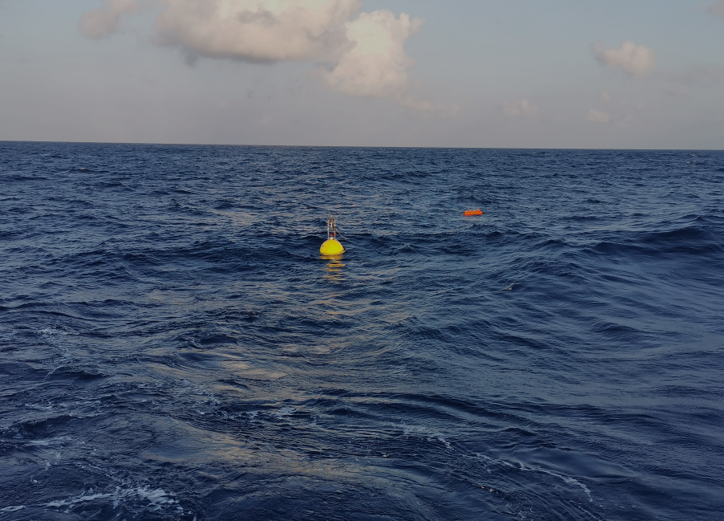 Earth & Space
Earth & Space
Hot currents: Global ocean circulation speeds up
Ocean circulation redistributes heat and shapes the marine environment. As the world’s oceans have been warming for decades, it is essential to determine how ocean circulation is changing due to global warming. Here, we find that the global ocean circulation has been accelerating substantially since 1990s. This is likely driven by increased greenhouse gas emissions related to human activities.

The Earth has experienced rapid warming in recent decades. This warming is caused by increased emissions of greenhouse gases related to human activities, as found by the Intergovernmental Panel on Climate Change (IPCC). The ocean is an important player in this process, as it is the major heat reservoir of the climate system. Ocean circulation redistributes oceanic heat on a global scale and shapes the weather and climate patterns. But changing climate also shapes the ocean circulation.
Understanding how the global ocean circulation responds to global warming is a key to predicting future climate change. Our current understanding of this process is limited due to a lack of systematic long-term ocean observations, particularly as it is likely to differ by oceans. As an alternative approach we assembled available ocean circulation and wind speed from multiple indirect sources.
We found that the intensity of the global ocean circulation increased significantly since early 1990s. The acceleration is particularly prominent in the global tropical oceans and reaches depths of thousands of meters. While we know the Pacific Ocean circulation tends vary over decades, our analysis shows a clear long-term trend of enhanced ocean circulation, overpowering the effects of its natural variability.
Wind speed on the ocean surface also increased, consistent with a deep-reaching acceleration of ocean circulation since early 1990s. Given that the atmospheric winds are a major energy source for driving ocean circulation, the speeding up of global sea surface winds is expected to naturally accelerate the global ocean circulation.
The changes in global ocean circulation and wind speed can be attributed to a combination of internal ocean dynamics - which are naturally variable - and external forces applied by human activities. To evaluate the effect of human activities, we compared the current global wind speed with predicted global wind speed under historical greenhouse gas emissions. The comparison indicates that increased emissions lead to increased sea surface wind speed. Hence, the acceleration of the global ocean circulation and sea surface winds is likely induced by increasing greenhouse gas emissions.
It is important to remember that the results of this study carry a level of uncertainty. Direct observations of ocean currents are lacking on a global scale, and even the available direct observations are confined to the upper 2000-meter layer of the ocean. The data we used comes primarily from analysis of measurements of oceanic temperature and salinity - Indirect data which inherently produce imperfect predictions. For this reason, there is an urgent need of direct observations to monitor the deep global ocean circulation, not only to understand past changes, but also to reduce the uncertainty in future projections of the global ocean circulation change.
As global ocean circulation increases, heat accumulated in the upper layer of the ocean will be transferred into the deep ocean more efficiently. This can lead to unexpected changes in marine ecological environments and spatial patterns of weather and climate. Further studies are needed to explore the multi-disciplinary implications of the accelerated global ocean circulation to provide better future predictions as well as possible approaches to mitigating the harmful effects of this process.
Original Article:
1. Hu S, Sprintall J, Guan C, et al. Deep-reaching acceleration of global mean ocean circulation over the past two decades. Sci Adv. 2020;6(6):eaax7727.
Edited by:
Dr. Ayala Sela , Associate Editor
We thought you might like
Ocean acidification and its effects on coral reef growth
Jul 8, 2016 in Earth & Space | 3.5 min read by Rebecca AlbrightResetting nature’s clock: shifting seasons and species relationships
Sep 14, 2016 in Earth & Space | 3.5 min read by Stephen Thackeray , Sarah BurtheThe silent battle of young corals against ocean acidification
Oct 19, 2016 in Earth & Space | 4 min read by Taryn FosterFor polar bears the cost of living is rising
Mar 13, 2018 in Earth & Space | 4 min read by George DurnerMore from Earth & Space
Discovery of the first radiation belt beyond the Solar System
Jan 27, 2025 in Earth & Space | 3.5 min read by Juan Bautista Climent OliverOne million (paper) satellites
Jan 24, 2025 in Earth & Space | 3 min read by Ewan Wright , Andrew FalleVolcanic Ash: A Nutrient Boost for Reef-Building Corals
Sep 18, 2024 in Earth & Space | 4 min read by Frank Förster , Tom SheldrakeAmmonia Energy: A Call for Environmental Awareness
Aug 29, 2024 in Earth & Space | 3.5 min read by Matteo Bertagni , Robert Socolow , Amilcare PorporatoLikely increase in coral thermal tolerance at a Pacific archipelago
Dec 29, 2023 in Earth & Space | 3 min read by Liam LachsEditor's picks
Trending now
Popular topics


